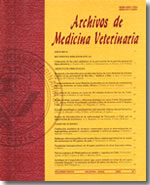Effect of the use of a recombinant bovine somatotropin (rbST) in dairy grazing cows in a tropical environment
Main Article Content
Abstract
This study deals with the evaluation of the effect of a recombinant bovine somatotropin (rbST) on dairy production and the metabolic status of dairy cows. Twenty crossbreed (Harton del Valle x Holstein) lactating cows (12 weeks of lactation) were selected at random, and separated into two groups (n=10 each), control group (GC) and treatment group (GT). The GT received 500 mg of rbST twice per month until 24 weeks of lactation. Daily milk yield was recorded every day until the end of the study, body condition score was evaluated, and the blood serum concentrations of glucose, cholesterol, and urea were analyzed, and milk urea was determined. Comparisons among groups to evaluate the effect of treatment and sampling period were made by using an ANOVA test. Milk production was higher (7.4%) in the GT (P<0.05). Body condition score was similar between groups (P>0.05). Mean blood serum concentration of glucose and cholesterol was similar between groups (P>0.05). There was a tendency for the concentration of urea in the milk (P=0.20) to be lower in the GT. The use of rbST induced a higher milk yield in dairy cows in a tropical environment, but the nutritional requirements of the cows in both groups were higher and the feed intakes were not sufficiently high to support these additional requirements.

